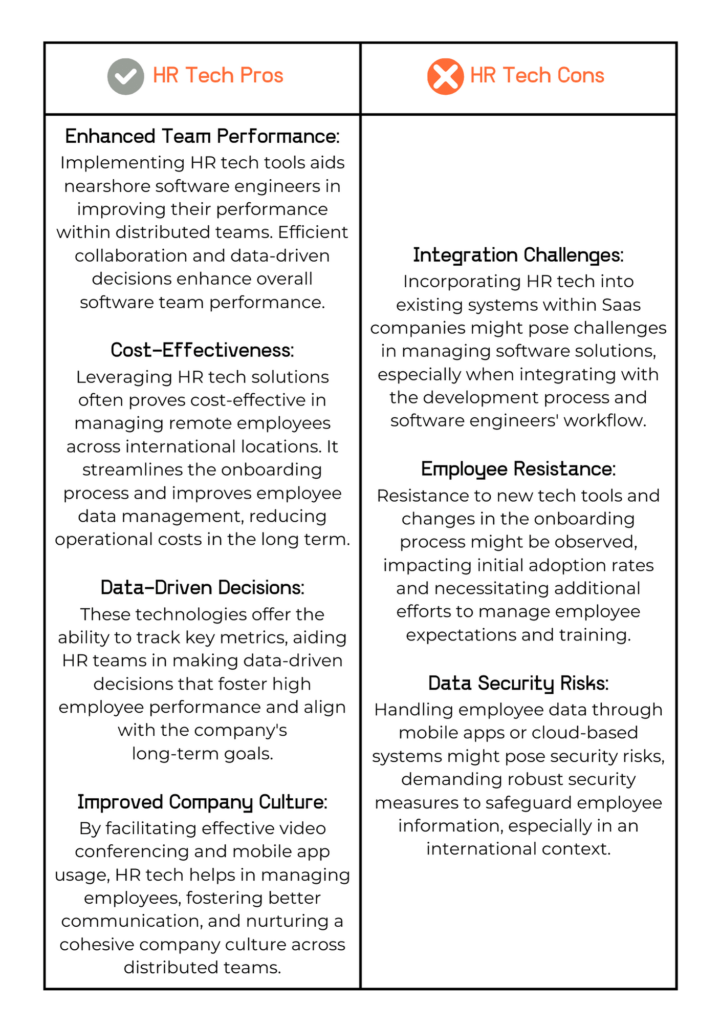In SaaS companies, payroll makes up a significant portion of operational costs, potentially reaching up to 70%. To streamline these expenses and heighten overall efficiency, SaaS companies increasingly turn to HR technology and analytics.
[ez-toc]HR Tech Types and Staple Brands
The realm of HR technology encompasses a diverse array of tools and platforms, each catering to distinct aspects of managing distributed teams in Saas companies. From performance management to fostering collaboration and ensuring data security, these tech types play pivotal roles.
Performance Management Systems
Brands like Workday and BambooHR offer software solutions tailored for managing employee performance and collaboration within distributed teams.
Onboarding and Talent Management Platforms
Leveraging tools such as JazzHR or Manatal streamlines the hiring process and talent acquisition for Saas companies, promoting a long-term vision for talent-as-a-service.
Communication and Collaboration Tools
Platforms like Zoom, Slack, and Microsoft Teams facilitate video conferencing and seamless communication, crucial for remote teams and international collaborations.
HR Analytics and Data Platforms
Brands like ADP and SAP SuccessFactors provide robust HR analytics tools, aiding in making data-driven decisions, managing employee data, and understanding key metrics for high performance.
Understanding these HR tech types and exploring staple brands within these categories unveils the arsenal of solutions available for optimizing operations and driving success in modern software companies.
4 Reasons Companies Should Adopt Advanced HR Technology
For Saas businesses eyeing efficiency and data-driven progress, investing in top-notch HR Tech spells a difference. These solutions transform processes, adding a layer of efficiency to work and injecting a more enjoyable and productive environment. Here are 4 reasons software companies should build an outstanding back office structure using HR Tech.
Reason 1: Streamlining HR Operations
Embrace cutting-edge HR tools to automate administrative tasks, from payroll management to performance evaluations. These HR Technology Solutions and integrated systems enhance efficiency, reducing manual errors and saving time, allowing HR teams to focus on strategic initiatives.
Implementing an integrated HRMS (Human Resource Management System) can significantly reduce manual administrative tasks for growing SaaS firms. Automating payroll, leave management, and onboarding processes can save over 30% of HR’s time, allowing them to focus on strategic initiatives like talent development.
- Sample Scenario: Picture a rapidly growing Saas venture dealing with numerous new hires. Leveraging HR Tech, they streamline onboarding, ensuring newcomers ease into their roles seamlessly while maintaining critical processes.
- Possible Result: Quick, seamless integration for new hires, allowing the company to scale without operational chaos.
Reason 2: Data-Driven Decision Making
Leverage analytics to derive actionable insights from HR data. Analyzing trends in employee performance, attrition rates, and skill gaps empowers informed decision-making, aiding in talent acquisition, retention strategies, and resource allocation.
Deloitte estimates more than 70% of companies will be relying on data analysis for their decision-making. Artificial Intelligence, for example, plays a pivotal role in bolstering employee retention by efficiently identifying employees likely to depart their roles with an impressive 95% accuracy, as reported by CNBC.
By utilizing predictive analytics, SaaS companies can analyze historical performance data to predict future hiring needs accurately. This proactive approach not only reduces recruitment costs but also ensures they have the right talent in place to support their growth trajectory.
- Sample Scenario: Imagine a Saas company keen on identifying top performers. HR Analytics helps them scrutinize metrics to assign the right talent to pivotal projects.
- Possible Result: Improved project outcomes, enhanced employee satisfaction, and optimized productivity.
Reason 3: Cost Optimization through Insights
HR analytics enables cost forecasting and optimization. By analyzing data patterns, identify areas of unnecessary expenditure, streamline processes, and reallocate resources effectively, thereby reducing operational costs.
SaaS startups use HR analytics to identify spikes in overtime costs correlated with certain project phases. By addressing resource allocation and restructuring project timelines, they can reduce overtime expenses, optimizing operational costs without compromising productivity.
- Sample Scenario: Consider a Saas startup navigating cost challenges. With HR Analytics, they analyze patterns, identify excessive expenses, and reallocate resources smartly, driving down operational costs without hampering productivity.
- Possible Result: Efficient resource allocation, reduced unnecessary expenditure, and optimized operations paving the way for sustainable growth.
Reason 4: Enhancing Employee Experience
Implement innovative HR technologies to personalize employee experiences. Tailored communication platforms, employee self-service portals, and AI-driven tools create a more engaging work environment, enhancing productivity and satisfaction.
The sky is the limit. In large corporations, introducing an AI-powered chatbot for employee inquiries significantly enhances employee experience for remote-first SaaS companies. The personalized, 24/7 support can increase employee engagement, resulting in a significant reduction in HR-related service requests.
- Sample Scenario: Visualize a company with a dispersed workforce. HR Tech fosters interactive apps and efficient tools, creating connectivity and swift support even in remote setups.
- Possible Result: Elevated employee satisfaction, reduced HR-related queries, and a strengthened sense of team collaboration.
Final Recap: HR Tech Pros and Cons
Embracing these innovations reaps numerous benefits, enhancing software team performance, promoting collaboration, and facilitating data-driven decisions. However, alongside these advantages, certain challenges emerge. Exploring the pros and cons of HR tech sheds light on its transformative potential while addressing the hurdles in its adoption.

Ubiminds Expertise in HR Tech

Ubiminds adapts its processes to include your HR tech and analytics solutions in its day-to-day. Our expertise aligns with your business objectives, optimizing HR operations and leveraging data insights for strategic decision-making.
After all, Ubiminds offers customized solutions to optimize your HR processes, improve efficiency, and drive data-informed strategies. Schedule a discussion with our experts to explore how we can support your SaaS expansion journey.

International Marketing Leader, specialized in tech. Proud to have built marketing and business generation structures for some of the fastest-growing SaaS companies on both sides of the Atlantic (UK, DACH, Iberia, LatAm, and NorthAm). Big fan of motherhood, world music, marketing, and backpacking. A little bit nerdy too!


